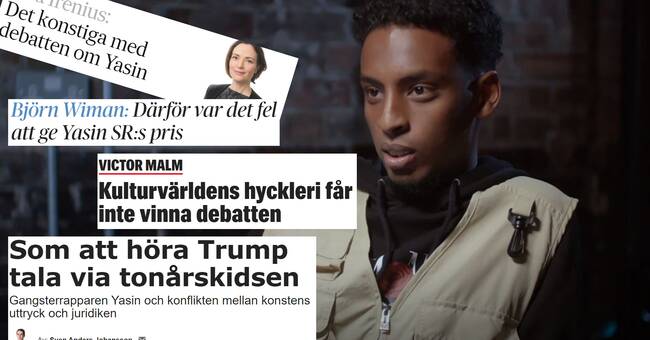The artist Yasin was praised as the artist of the year on P3 Gold - and was charged three days later with stamping for kidnapping (something he denies).
Once again, the debate about the gangster rap's connection to crime is exploding.
The positions are familiar by now:
Conservatives see a moral flaw in praising an artist suspected of serious crime, while a more liberal phalanx wants to differentiate between work and person.
If you read the 700-page preliminary investigation into the kidnapping Yasin is suspected of having been involved in the planning, interestingly enough, the same question is at the center: Does the perpetrator of gangster rap need to have an actual connection to crime?
If you ask the suspects, the answer seems to be yes.
In encrypted chats SVT has taken part in, it is discussed how a humiliation robbery should "pepper the career" for a minor artist who is considered to be "studio gangster", ie not genuine enough to rap about the criminal life.
The artist is to be revealed as a poser,
and two other rappers are suspected of having lured plaintiffs to an apartment outside Stockholm, where they and nine other people are then said to have threatened, robbed and abused the young artist - and then photographed him under degrading circumstances.
The suspects are so sure of the gangster rap's demands for authenticity that the images after this are described as "nuclear weapons" - something the young artist's hard image cannot possibly survive.
After a suspicious attempt at extortion, the pictures are leaked on social media - where they are widely circulated.
So far, critics of the genre seem to be right: To completely differentiate between gangster rap and crime becomes difficult when prominent rappers in the genre themselves see it as a basic requirement.
But if we look at the consequences
, the question becomes more complicated.
Today - a year after the kidnapping is suspected to have taken place, months after pictures from the humiliation robbery were leaked online - the effect of the kidnappers' so-called nuclear weapons has not materialized.
The artist in question continues to be one of the greatest in Swedish hip hop, and now makes lucrative collaborations with great artists outside the world of gangster rap.
Does that mean the gangster rapist's defenders are right?
One can distinguish between work and person, and the audience is attracted by the stories and music, rather than the authenticity of the rappers themselves?
Maybe, but at the same time, the young artist has consistently refused to cooperate with the police in the investigation into his own kidnapping.
If the audience has stayed with a gangster rapper who testifies in criminal cases, we can only speculate.
On the other hand, it can be stated
that the only careers that have been ironically sabotaged are the accused rappers' own, at least if they are convicted of the crimes they deny.
Not because their fans will turn their backs on them, gangster rap is perhaps the least moralistic music genre, and the audience is refined when it comes to listening to problematic artists.
But all hip-hop is living
in a pulsating now, and success does not wait for a prison sentence.
Will gangster rap still be the biggest music genre in Sweden in 4 - 18 years (the penalty scale for kidnapping)?
Will the rappers' positions in the genre wait for them while they are inside?
It is possible, but unlikely.
Something that is rarely mentioned in the debate about gangster rap is that it is extremely unusual for those who stick to a criminal lifestyle to achieve long-term success.
Hip-hop history, on the other hand, is full of young men who have been attracted and destroyed by the same harsh reality they wanted to reflect in their music.

